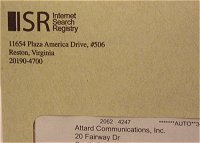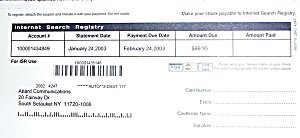|
Watch Out for Invoice Scams
By Janet Attard
It looks like a bill.
It has an Account Number, Statement Date and Payment Due Date.
The return address on the envelope says Internet Search Registry
As you turn the accordion-folded piece of paper over, you see your domain
name.
And if you lift the folded panel, you'll even see small print.


So, you think it must be your domain renewal notice, or some service you agreed
to buy when you registered your domain. And you'd better write out a check now,
before the due date. Right?
Wrong.
It's an ad. A very misleading ad. One that has been very carefully designed to
look like an invoice. Although the word invoice doesn't appear any place in the
mailing, neither does a disclaimer that the ad is not a bill, as required by
postal laws. In fact, the entire document is so confusingly similar to an
invoice, that it is fooling small business owners and their employees.
One web developer noted that two of her customers got mailings that looked like
invoices and called her before paying the bills to see if she had signed them up
for a search engine optimization service. (She had not.) And when Business
Know-How got several of these invoice look-alikes ourselves, we had to look
pretty closely to determine whether it was a notice from the domain registrar or
notice of renewal for any of the annual pay for placement search engine listings
we have legitimately purchased.
The misleading ad that Business Know-How received was from a company that
promises to register your business name with various search engines. And the
company that produced the ad didnít stop at putting the squeeze on domain owners
to shell out $69.95 for the service. The small print on the back side of the
document included a clause stating that your account will automatically be
re-billed once a year. The only way to avoid the automatic renewal charge is to
send a written notice by traditional postal mail at least 30 days before the
contract automatically renews. Email, the document says, and telephone calls
won't get you off the hook. In fact, while the company lists three office
locations, it does not list a phone number any place on the ad.
Whether this misleading ad is a scam is something a court of law would need to
decide. However, small business owners should know that invoice schemes and
scams are an ongoing and expensive problem. Strapped for time, business owners
either quickly glance at and make decisions about small invoices, or delegate
responsibility for cutting checks to some equally time-pressed employee.
Although no one has been able to pin an exact figure on the amount of money that
is lost to invoice scams and schemes each year, the Better Business Bureau
speculates the losses to business could run into the billions.
Protect Yourself
To keep your company (or yourself!) from spending money for purchases you don't
want, put these practices in place:
Read the entire notice carefully. If it looks like an invoice and you don't
remember ordering the product or service, be particularly cautious. Remember you
are not obligated to pay for anything you haven't ordered.
If you are unsure whether an invoice is legitimate, call the company and ask for
details of your purchase. If there is no way to get in touch with the company
other than by sending a letter, be very skeptical.
Read the small print. Even if the company is legitimate and you think you'd like
to order the product or service, be sure that doing so won't get your credit
card dinged for repeated charges.
If you use purchase orders, check all invoices against the purchase orders.
When you do sign up for internet services, watch for an acknowledgement page.
Print it out and save it, then compare bills to your printed purchase receipts
Train your employees to look for bogus invoices
Limit the number of people who can pay invoices to just one or two.
If you do get a solicitation you believe to be a scam, save the envelope and the
letter, and contact the Postal Service fraud division and the Federal Trade
Commission
About the author
Janet Attard is the owner of Attard Communications, Inc., which provides
editorial content, online community and web development services. She is the
founder of MLMKnowhow.com and Businessknowhow.com. Janet is also the author of
The Home Office And Small Business Answer Book and of Business Know-How: An
Operational Guide For Home-Based and Micro-Sized Businesses with Limited
Budgets. She can be reached by email at attard@businessknowhow.com.
Next |
